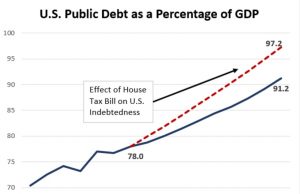Dick Cheney’s famous statement “deficits don’t matter” is generally associated with the Bush administration’s philosophy on taxation. A strong case can be made, however, that this view of budget policy also influenced that administration’s spending policies. Between 2000 and 2008 federal outlays grew at an average rate of nearly seven percent a year for the eight years of that administration — a little more than twice the rate of growth in the previous eight years. If you take inflation into account, the rate of real dollar growth in government spending was more than five times faster in the Bush administration than during the previous eight years.
I would argue, further, that this “deficits don’t matter” mindset not only guided policy on how much should be spent but also seems to have influence policy with respect to how carefully federal money should be spent. Long-standing checks and balances needed to insure proper expenditures were largely disregarded by the Bush administration. The justifications sent to Congress explaining why money was needed and what it would be used for became less and less specific — and quite often less accurate. The annual budget process in which choices are made by weighing all priorities at a single point in time was basically abandoned. Mammoth annual supplemental appropriations funded anything left out of the original budget. In essence there was no budget.
Nothing epitomizes the fiscal recklessness of this period as much as what happened in the area of federal contracting. While overall spending grew by 66 percent over the eight-year period, contract spending grew by 163 percent, from a little more than $200 billion to well over $500 billion. Much of the growth in contract spending was for contracts that were not fully competed. Worse still, there is ample evidence that non-competitive contracts were increasingly directed to favored businesses whose political connections were better than their ability to meet the government’s need for goods and services.
One example was a 2002 contract given to a startup company owned by a man who had worked at the Pentagon a decade earlier, Mitchell Wade. Wade reported directly to Duane Andrews, an Assistant Secretary of Defense who had come to the Department from Capitol Hill as a staffer for then Rep. Richard Cheney (R-WY), moving with Cheney when he became Secretary of Defense. Remarkably, in 2002 Wade’s company, MZM, Inc., won a $140,000 White House contract to provide furniture and computers to the office of Vice President, which by that time was occupied by Cheney. This was despite the fact that MZM had never before sold either furniture or computers to anyone, and despite the fact that the company had never previously sold to the federal government.
The company got four more White House contracts, but made its real money with a series of personnel service contracts with two small Defense Department agencies newly created by Defense Secretary Donald Rumsfeld in ongoing collaboration with the Vice President’s office. Within three years the company expanded from no revenues and no employees to the Washington Post‘s list of the top 100 government contractors. The business was so lucrative that Wade decided it was worth the risk and expense to offer more than a million dollars in bribes to then Rep. Randy “Duke” Cunningham (R-CA) simply to increase funding levels for the agencies that were providing him with contracts.
A company known as Custer Battles was another startup that began winning huge government contracts during the same period. One of the company’s cofounders, Michael Battles, had just completed an unsuccessful campaign as a Republican candidate for Congress in Rhode Island. According to a 2007 article in Vanity Fair, he and his business partner, Scott Custer, were given permission by the White House to enter Iraq shortly after coalition troops seized control of Baghdad.
The Los Angeles Times described the company as “newly formed… with no experience in the security industry” which nonetheless, “landed one of the first contracts issued in Iraq in the spring of 2003… The no-bid contract was worth $16 million.” The contract was to secure civilian aviation at the Baghdad Airport which was at the time and continued to be non existent. And according to Vanity Fair:
The company faced immediate obstacles. Custer and Battles didn’t have any money, they didn’t have a viable business, and they didn’t have any employees. Bremer’s Coalition Provisional Authority had overlooked these shortcomings and forked over $2 million anyway, in cash, to get them started, simply ignoring long-standing requirements that the government certify that a contractor has the capacity to fulfill a contract. That first $2 million cash infusion was followed shortly by a second. Over the next year Custer Battles would secure more than $100 million in Iraq contracts.
Then there’s the Coalition Provisional Authority’s director of airport security, who wrote in a memo obtained by 60 Minutes: “Custer Battles has shown themselves to be unresponsive, uncooperative, incompetent, deceitful, manipulative and war profiteers. Other than that they are swell fellows.”
Another contract awarded Custer Battles involved support for the massive currency exchange. A spreadsheet accidentally left after a meeting between company officials and the Coalition Provisional Authority showed that the currency-exchange operation had cost the company $3,738,592, but CPA was billed $9,801,550, a markup of 162 percent.
Eventually the company was banned from contracting by the Air Force and hauled into federal court when whistleblowers presented information indicating massive overbilling through the use of grossly inflated purchases from shell subcontractors wholly owned by Custer Battles.
My colleague at the Center for American Progress, Pratap Chatterjee, documents numerous other contracting abuses during that period in his book, Halliburton’s Army, How a Well-Connected Texas Oil Company Revolutionized the Way America Makes War.
But with the exception of the currency-exchange contract in which Custer Battles accidentally left a spreadsheet behind for government auditors to examine, we have very little information as to exactly how rich the profits were for these any of these contractors. Clearly the margins were high, but how much more were the contractors charging the government than they themselves paid for the products they were providing? We can only guess.
Last spring, however, I stumbled across a document that provided some real insight into the profitability of yet another government contractor, Emergent BioSolutions Inc. The results were stunning and are the subject of a recent report I wrote for the Center for American Progress, entitled Getting Rich on Uncle Sucker, Should the Federal Government Strengthen Efforts to Fight Profiteering.
The reason the information was available was because of an unusual confluence of circumstances. First, unlike either of the previous two examples, the contractor was a publicly-held company that had under federal law to issue an annual report stating its revenues and cost of operations. Second, the company sold only one product. Thirdly, it had only one customer, the federal government.
In brief, the company provides the government with a vaccine known as BioThrax to combat anthrax. The annual report filed with the Securities and Exchange Commission indicate that last year’s revenues from product sales totaled $217 million. The company’s cost of product sales were $46 million. The report further indicates that the company has been enjoying these kinds of profits for a long time. Further research indicated that over the period of the last decade they have collected more than $1.3 billion in federal payments at a cost of less than $0.3 billion.
Despite claims made by the company in response to our inquiries that they merited such extraordinary margins because of the degree of risk they took in becoming a provider of this product, the record indicates that they took almost no risk at all. The vaccine itself was actually developed by the U.S. Army. The facilities in which it is manufactured were built by the State of Michigan and purchased by the contractor with a down payment of $2.25 million — despite the fact that the facility had accounts receivable of $4.5 million. The cost of renovating the facility and bringing it and the processes for vaccine production up to U.S. Food and Drug Administration standards were almost entirely paid for by the U.S. Army.
It is remarkable how many people, including House Minority Leader John Boehner (R-OH), claim to be sincerely interested in reducing the federal budget deficit but have seemingly have no interest in taking on these kinds of abuse in contracting — abuses that grew dramatically when their party controlled the Congress and the White House.










